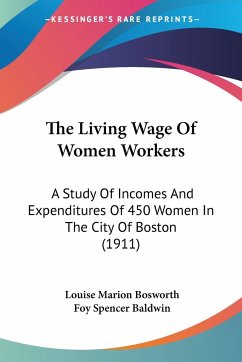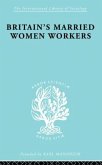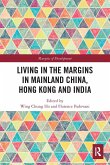The Living Wage of Women Workers: A Study of Incomes and Expenditures of 450 Women in the City of Boston is a book written by Louise Marion Bosworth and published in 1911. The book is a study of the incomes and expenditures of 450 women who worked in various industries in Boston at the time. Bosworth conducted the study to determine if the women were earning a living wage, which she defined as ""a wage sufficient to maintain the worker in health and decency."" The book is divided into several chapters, each of which focuses on a different aspect of the women's lives. The first chapter provides an overview of the study, including the methods used to collect data and the characteristics of the women who were surveyed. The second chapter examines the women's incomes, including their wages, hours worked, and the types of jobs they held. The third chapter looks at the women's expenditures, including their spending on food, clothing, housing, and other necessities. Bosworth compares these expenditures to the estimated cost of living in Boston at the time, and concludes that many of the women were not earning a living wage. The fourth chapter explores the women's living conditions, including the type and quality of housing they could afford. Bosworth finds that many of the women lived in crowded and unsanitary conditions, which contributed to their poor health and low quality of life. The final chapter of the book offers recommendations for improving the economic and social conditions of women workers in Boston. Bosworth argues that employers should pay a living wage, that the government should regulate working conditions and housing standards, and that women should be given more opportunities for education and training.Overall, The Living Wage of Women Workers is an important historical document that sheds light on the economic and social struggles faced by women in the early 20th century. It remains relevant today as a reminder of the ongoing fight for fair wages and working conditions for all workers, regardless of gender.This scarce antiquarian book is a facsimile reprint of the old original and may contain some imperfections such as library marks and notations. Because we believe this work is culturally important, we have made it available as part of our commitment for protecting, preserving, and promoting the world's literature in affordable, high quality, modern editions, that are true to their original work.
Hinweis: Dieser Artikel kann nur an eine deutsche Lieferadresse ausgeliefert werden.
Hinweis: Dieser Artikel kann nur an eine deutsche Lieferadresse ausgeliefert werden.








